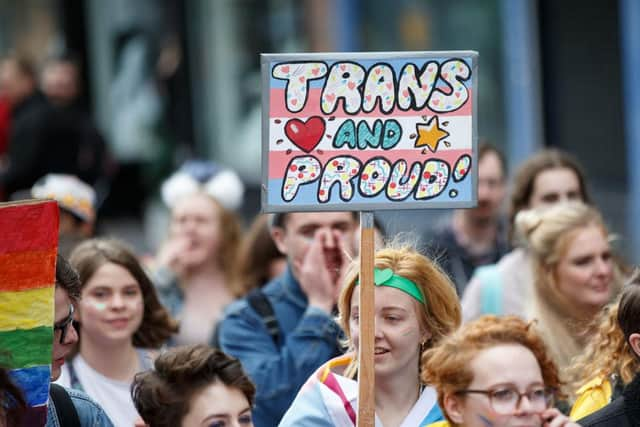‘A missed opportunity’ - LGBT charities react to news that cost for changing legal gender will be reduced to £5
and live on Freeview channel 276
According to reports, the fee to apply for a gender recognition certificate is to be significantly reduced from next month.
Government sources have confirmed to the BBC that the fee that a person has to pay in order to change their legal gender, which is currently £140, will be reduced to around £5 from May.
‘Kinder and more straightforward’ applications


Advertisement
Hide AdAdvertisement
Hide AdEqualities Minister Liz Truss committed in September to making applying for a gender recognition certificate “kinder and more straightforward” and said that the fee would be reduced.
Under the current Gender Recognition Act (GRA), a person has to undergo around a two-year waiting period and attend a review or appearance before a specialist panel before being able to legally change their gender, on top of the £140 fee.
Following a public consultation, Truss announced that the Government had rejected calls for people to be able to self-identify their gender and change their birth certificates without a medical diagnosis.
At the time, ministers said that reform of the 2004 GRA was not “the top priority” for transgender people.
Advertisement
Hide AdAdvertisement
Hide AdInstead, the minister said that the cost of applying for a gender recognition certificate would be reduced to a “nominal amount” and that the process would be moved online.
‘A missed opportunity’
The Equality and Human Rights Commission (EHRC) called the move a “missed opportunity to simplify the law on gender recognition”, while the LGBT Foundation said that it was “incredibly disappointed”.
Nancy Kelley, Chief Executive of LGBT charity Stonewall, told the BBC that any fee “creates a barrier for some trans people” and urged the Government to commit to a timeline of further changes to the process.
She said: “However, none of these changes are a substitute for meaningful reform to the Gender Recognition Act.”
Advertisement
Hide AdAdvertisement
Hide AdA spokesperson for the Equalities Office said: “The Government is committed to making the process of applying for a gender recognition certificate as straightforward and dignified as possible.
“We are progressing work at speed to simplify this process as well as reducing the fee and further details will be available imminently.”
Lee Clatworthy, from national transgender charity Sparkle, stated that the process remains “overly long-winded” and that a reduction in cost “won’t compel more to apply”.
The fee reduction is understood to be UK wide, however the consultation does not affect how the gender recognition system operates in Northern Ireland, and the Scottish government has carried out its own consultation.
How to apply for a Gender Recognition Certificate
Advertisement
Hide AdAdvertisement
Hide AdCurrently, there are three different ways a person can apply to get a certificate, and each path depends on the individual situation on the applicant.
You would apply via the “standard route” if all the following are true:
- You’re 18 or over
- You’ve been diagnosed with gender dysphoria
- You’ve lived in your acquired gender for at least two years
- You intend to live in your acquired gender for the rest of your life
Advertisement
Hide AdAdvertisement
Hide AdYou would follow the “alternative route” if all the following are true:
- You’re 18 or over
- You’ve been diagnosed with gender dysphoria or have had surgery to change your sexual characteristics
- You live in England, Wales, Northern Ireland or Scotland most of the time
- You intend to live in your acquired gender for the rest of your life
Advertisement
Hide AdAdvertisement
Hide Ad- You’re in (or have been in) a protected marriage or protected civil partnership before 10 December 2014 (16 December 2014 for Scottish marriages and civil partnerships)
Finally, you would apply via the “overseas route” if your acquired gender has been legally accepted in an “approved country or territory” and you have the documents to prove it. You must also be 18 or over to take this route as well.
Regardless of which route you decide to take, you’ll need to download and fill in your application which can be found on the Government website.
Then you would send the completed form with your fee and any supporting documents relevant to your application to:
Gender Recognition Panel
PO Box 9300
Leicester
LE1 8DJ
Advertisement
Hide AdAdvertisement
Hide AdFor help with your application, you can contact the administrative team at the Gender Recognition Panel for advice on the application process. You can get in touch via email at [email protected] or by telephone by calling +44 (0) 300 1234 503.